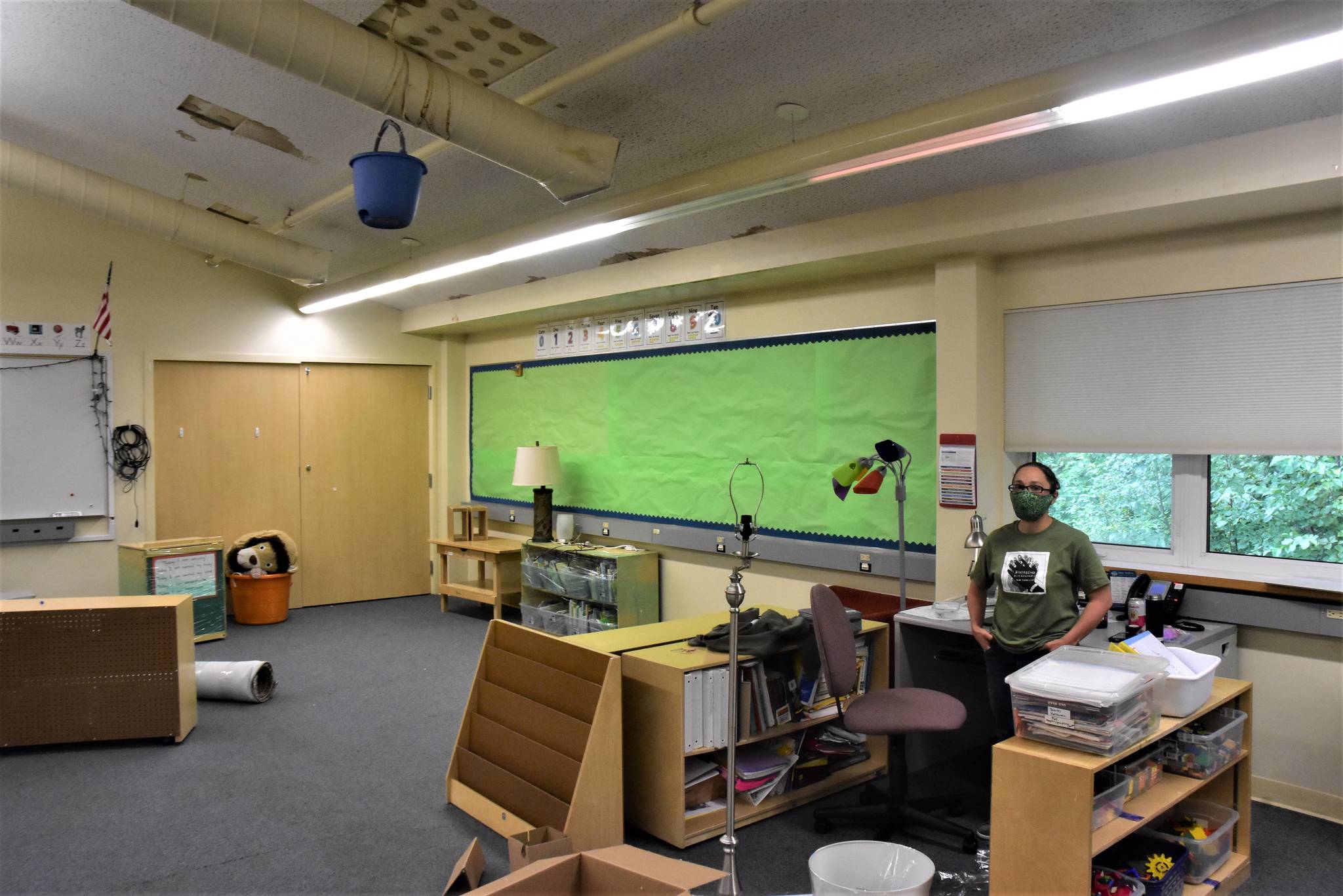The troubles with Riverbend Elementary School’s roof go back over 20 years to its construction in 1997, and on Friday a blue bucket was hanging from the ceiling in a kindergarten classroom there, ready to catch the leaking water that would inevitably come.
“It was leaking years before this was my classroom,” said Christi Martz, a Kindergarten teacher at Riverbend. “This is my third year in this classroom.”
Martz was in her classroom Friday, gearing up for the new school year which starts with distance-delivered learning Monday, Aug. 24. Even though this school year is starting entirely online, students will eventually return to the classroom. Leaking at Riverbend is so bad that Martz and other teachers have buckets or trash cans set out to catch dripping water.
She had put in work orders with the Juneau School District when the roof was actively leaking, Martz said, but the cause of the leaking was the roof itself, which needed an overhaul. Leaking has been so persistent in some of Riverbend’s classrooms that tiling on the ceiling periodically falls off, worrying Martz one might fall on a student. The tiles themselves wouldn’t be particularly dangerous, she said, but she is uncomfortable with the idea of debris falling on her students.
City Manager Rorie Watt recalled “tortured construction arguments” over who was at fault for the leaky roof, but according to Daniel Bryant, maintenance supervisor for the district, the original contractor previously made repairs to the roof but leakage problems continued.
“If we can’t keep the water out we can’t keep the structure up,” Bryant said.
[City proposes $15 million bond package to stimulate economy]
First-grade teacher Amanda Swanson said she had been instructed to keep students away from an area of her classroom where tiles had fallen over the summer. On Friday, a 10-gallon trash can sat beneath a stained section of the ceiling.
The City and Borough Assembly voted earlier this month to send a $15 million bond package to Juneau voters in October to pay for a number of repair and maintenance projects, chief among them repairs to city school roofs which have been leaking for years.
The bond package was proposed by the Economic Stabilization Task Force set up to help guide the city through the economic fallout caused by the coronavirus pandemic. The task force proposed the city start work on a number of long-needed city projects like road repair, park maintenance and in its first iteration proposed constructing a second crossing to Douglas Island.
The second crossing was eventually dropped from the bond package. The city announced Monday it had reached an agreement with the state Department of Transportation and Public Facilities to study a second crossing, but that study and any subsequent project are unrelated to the bond package.
City officials eventually proposed $15 million to be split three ways. Roads, parks and schools are proposed to receive approximately $5 million each, according to the bond proposal language. But those numbers are being kept flexible on purpose. The cost of school roof repairs is estimated to be about $7 million, so funds are being requested as a block to avoid having to appropriate more money for cost overruns on a single project.
Riverbend’s roof is one of three the district wants repaired with bond dollars, said Superintendent Bridget Weiss. Roofs at Sayéik: Gastineau Community School and Dzantik’i Heeni Middle School need repairs as well, together totaling about $7 million.
Sayéik: Gastineau’s repairs are expected to cost roughly $1.55 million, Weiss told the Empire in a phone interview Friday, while Dzantik’i Heeni and Riverbend need $2.65 million and $2.8 million respectively.
The district is continuously reviewing its maintenance needs with the city, Weiss said, which is why roofs quickly became a priority for bond projects.
“Because we do this work routinely, where we’re examining our priorities and analyzing costs, that is exactly why this rose to the top,” she said.
Historically, the city would support school maintenance with the help of the state, but cuts by the state to school bond repayments in recent years have made city officials look to other funding sources, said City Manager Rorie Watt. The Assembly has funded about $1 million per year in school repairs recently, Watt said, but based on the size of the district’s physical plan, best practices say the city should be spending about $6-9 million a year on maintenance.
“That said, a number of our schools are in pretty good condition because they are pretty new,” he said.
But roofs, he said, “are expensive and they don’t get better over time.”
[Assembly sends $15 million bond package to voters]
Bonds would be paid for over 25 years, according to the text of the ordinance proposing the package.
The new school year is set to begin for most grades on Monday, but students won’t be actually back in the classroom for some time as the coronavirus pandemic has officials concerned about mass gatherings.
But the roofs are long-term problems, Weiss said.
“The state of our health as a community is relatively short term, and we are doing everything we can to keep our students and staff safe,” she said. “Roofs are a long-term problem. When we return we know how important it is to have a safe environment. This issue is not new, we have the opportunity now to take care of it and have lasting impacts.”
• Contact reporter Peter Segall at psegall@juneauempire.com. Follow him on Twitter at @SegallJnoEmpire.

